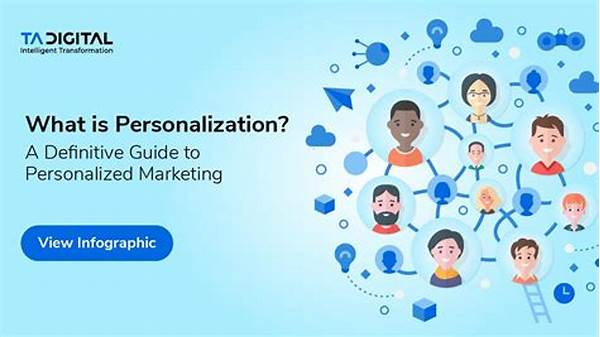In the contemporary digital landscape, the concept of personalization in digital marketing has emerged as a pivotal strategy for businesses aiming to enhance customer experiences and foster deeper relationships. The digital transformation has ushered in an era where consumers expect customized interactions that are tailored to their preferences, behaviors, and needs. This shift necessitates that marketers adopt sophisticated techniques to effectively cater to unique individual preferences. Personalization in digital marketing not only facilitates a more engaging customer journey but also significantly boosts conversion rates and brand loyalty, positioning businesses ahead of their competitors.
Read Now : Innovation Hub Establishment Strategies
The Importance of Personalization Strategies
In the realm of personalization in digital marketing, various strategies play a crucial role. Customizing content according to user preferences is a primary approach, as it dramatically improves user engagement by providing relevant information that aligns with their interests. Behavioral targeting further enhances personalization strategies by allowing businesses to serve ads based on user actions and past interactions. Data analytics serves as the backbone for these strategies, enabling marketers to gather insights and refine their approaches continuously. The use of AI-powered tools also facilitates real-time personalization, allowing brands to adapt swiftly to changing customer needs. Ultimately, personalization strategies are integral in creating a more interactive and meaningful online presence.
Key Techniques in Personalizing Digital Content
1. User Segmentation: This involves dividing the audience into distinct groups based on demographics, behavior, and preferences, facilitating targeted marketing efforts.
2. Dynamic Content Generation: Utilizing platforms that adapt content dynamically based on user behavior enhances personalization in digital marketing by providing relevant experiences.
3. Predictive Analytics: By leveraging historical data, predictive analytics anticipates consumer needs, enabling proactive personalization in digital marketing.
4. Personalized Email Campaigns: Crafting emails that speak directly to individual interests and behaviors boosts engagement metrics significantly.
5. Real-Time Personalization: Implementing solutions that allow for immediate adaptation to consumer actions ensures a seamless and personalized user journey.
Personalization in digital marketing is further enhanced through these techniques, each offering a unique approach to connecting with consumers on a more personal level.
Read Now : Musical Theater Skills For Kids
Challenges and Solutions in Personalization
Embracing personalization in digital marketing poses certain challenges, primarily concerning data privacy and the ethical use of consumer data. As businesses strive to offer tailored experiences, they must also ensure compliance with regulations such as GDPR, which governs how personal data is collected and used. Additionally, managing the complexity of data integration across various platforms presents challenges in maintaining consistency in personalization efforts. To address these challenges, businesses can invest in robust data management systems and uphold transparency with consumers regarding data usage. By doing so, marketers can balance personalization with privacy, ultimately fostering trust and customer satisfaction.
Balancing Personalization with Privacy Concerns
The interplay between personalization in digital marketing and privacy concerns is a delicate one. While personalization is crucial for engaging customers with relevant content, it is paramount that this does not come at the expense of consumer privacy. Developing transparent data policies and giving consumers control over their data usage are essential steps in mitigating privacy concerns. Furthermore, leveraging anonymized data can help marketers gain valuable insights without infringing on personal privacy. In ensuring that personalization efforts respect consumer privacy, businesses can build a foundation of trust and reliability, essential for long-term success in the digital market.
Innovative Tools for Enhanced Personalization
As technology continues to evolve, so too do the tools available for personalization in digital marketing. Leveraging customer relationship management (CRM) systems, artificial intelligence (AI), and machine learning techniques can significantly enhance personalization efforts. CRM systems allow for comprehensive data collection, offering a 360-degree view of customer interactions and preferences. Meanwhile, AI and machine learning provide sophisticated algorithms that predict consumer behavior, allowing marketers to preemptively address customer needs. Employing these innovative tools, businesses can craft highly personalized marketing campaigns that resonate with individuals on a deeper level, setting themselves apart in an increasingly competitive digital space.
The Future of Personalization in Digital Marketing
The trajectory of personalization in digital marketing promises continued advancements that will redefine customer-brand interactions. As consumer expectations evolve towards more individualized experiences, marketers must anticipate these changes and adapt accordingly. Future innovations are likely to include augmented reality (AR) and virtual reality (VR) technologies, offering immersive personalized experiences. Furthermore, the integration of blockchain technology for secure data transactions is poised to enhance transparency in personalization efforts. As personalization techniques become more sophisticated, marketers can look forward to new avenues for engaging with consumers, ultimately shaping the future of digital marketing.
